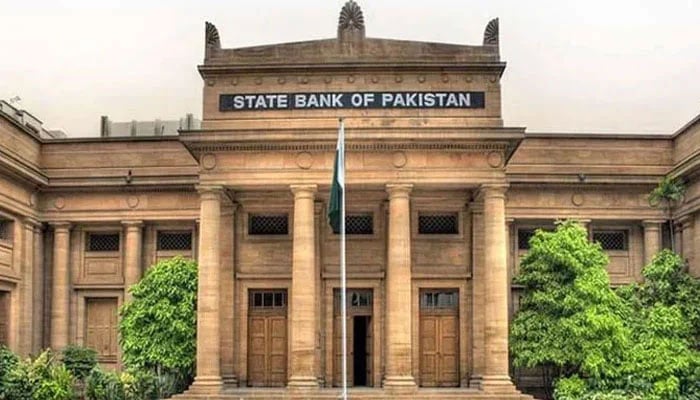SBP seen poised for another rate cut
KARACHI: Pakistan is expected to see single-digit inflation for the first time in three years in August, which may allow the central bank to cut interest rates for a third consecutive meeting this month.
Cooling inflation, manageable current account deficit, and emphasis on economic growth are also anticipated to prompt the country’s central bank to continue with the monetary easing cycle.
Analysts agree that price pressures will likely continue to ease, with the consumer price index (CPI) inflation predicted to hover at 9.0 per cent for August. The Pakistan Bureau of Statistics (PBS) releases inflation numbers on the first of every month.
The upcoming monetary policy review will take place amid a delay in the final approval of a new $7 billion loan programme from the IMF for Pakistan, as the country struggles to plug its external financing gap. Last week, Moody’s Ratings upgraded Pakistan’s ratings to Caa2, pointing to the country’s improving macroeconomic conditions and moderately better government liquidity and external positions, which were previously at very weak levels.
Despite a 60 basis points (bps) month-on-month increase in CPI, headline inflation is expected to decrease to single digits in August, according to a report from Insight Securities released on Thursday.
“We estimate August inflation to be 9.9 per cent, down from 27.4 per cent in the same period last year and 11.1 per cent in the previous month. This marks the first monthly single-digit inflation reading since October 2021, when headline CPI was recorded at around 9.2 per cent,” it said.
“We anticipate another 100bps cut in the benchmark rate in the upcoming MPC meeting,” it added.
The State Bank of Pakistan (SBP) has reduced interest rates for two consecutive meetings, bringing the rate down from a historic high of 22 per cent to 19.5 per cent. The SBP’s monetary policy committee (MPC) is set to meet on September 12 to review the monetary policy once again.
Analysis suggests that the recent decrease in secondary market yields and the real interest rate, which is nearing 9.0 per cent, will likely lead to another rate cut by the SBP’s MPC.
“We maintain our earlier stance of gradual and moderate monetary easing, with a December 2024 benchmark rate forecast of 15 per cent, despite the further slowing down of inflation due to the high base effect,” Insight Securities said.
“We expect FY25 inflation to average 10-10.5 per cent, with inflation expected to reach a low of early 7.0 per cent in January 2025 and then increase to 14 per cent by the end of June 2025 due to the low base effect,” it added.
“Going ahead, the inflation trajectory will largely depend on the approval of the IMF programme, which is crucial for maintaining stability in the local currency. International commodity prices also play a significant role, as any increase could be detrimental to our fragile economic stability.”
In a note issued last week, JS Research expects inflation to reach 9.3 per cent year-on-year in August and anticipates a 150bps cut, which will bring the policy rate down to 18 per cent at the September meeting.
Some analysts have opined that despite the consensus on a 150bps reduction, the MPC may be happy with a 100bps rate cut to control dollarization and the increasing interest in purchasing gold, and to maintain the satisfaction of the IMF.
-
 Ryan Coogler Shares Thoughts About Building Community Of Actors Amid 'Sinners' Success
Ryan Coogler Shares Thoughts About Building Community Of Actors Amid 'Sinners' Success -
 Heidi Klum Gushes Over Diplo Collab 'Red Eye' Despite DJ Falling Asleep During Video
Heidi Klum Gushes Over Diplo Collab 'Red Eye' Despite DJ Falling Asleep During Video -
 Israel Behind Majority Of Journalist Deaths Worldwide, Watchdog Claims
Israel Behind Majority Of Journalist Deaths Worldwide, Watchdog Claims -
 'It Would Become A Circus' : Inside Jane's Turmoil For 'little Sister' Fergie Whose Hidden From The World
'It Would Become A Circus' : Inside Jane's Turmoil For 'little Sister' Fergie Whose Hidden From The World -
 Inside Cardi B's Real Feelings Related To Stefon Diggs Split Post One Year Of Romance
Inside Cardi B's Real Feelings Related To Stefon Diggs Split Post One Year Of Romance -
 Former Sri Lankan Intelligence Chief Arrested Over 2019 Easter Bombings
Former Sri Lankan Intelligence Chief Arrested Over 2019 Easter Bombings -
 Kristen Bell Shares One Rule For 'SAG' Awards Ceremony That She Will Ditch This Time: 'Happy And Fun'
Kristen Bell Shares One Rule For 'SAG' Awards Ceremony That She Will Ditch This Time: 'Happy And Fun' -
 Woman Suing Meta Platforms, YouTube Over Social Media Addiction Sticks To Claims After Trial
Woman Suing Meta Platforms, YouTube Over Social Media Addiction Sticks To Claims After Trial -
 Shakira Applauded For 'gracious' Behaviour By Fans As She Blends Work With Family Downtime
Shakira Applauded For 'gracious' Behaviour By Fans As She Blends Work With Family Downtime -
 Mexico’s President Considers Legal Action Over Elon Musk Cartel Remark
Mexico’s President Considers Legal Action Over Elon Musk Cartel Remark -
 Prince William Hits The Roof With The Andrew Saga Bleeding Into Earthshot
Prince William Hits The Roof With The Andrew Saga Bleeding Into Earthshot -
 HBO Gives Major Update About 'Industry' Season Five And Show's End
HBO Gives Major Update About 'Industry' Season Five And Show's End -
 Donnie Wahlberg Responds To 'Boston Blue' Backlash: 'Nobody Was More Disappointed Than Me'
Donnie Wahlberg Responds To 'Boston Blue' Backlash: 'Nobody Was More Disappointed Than Me' -
 Jennifer Garner Gets Emotional Over Humble Career Start: 'It Makes Me Want To Cry'
Jennifer Garner Gets Emotional Over Humble Career Start: 'It Makes Me Want To Cry' -
 Princess Beatrice Told An Acquaintance That She ‘likes’ Jeffrey Epstein: Grim Verdict Drops
Princess Beatrice Told An Acquaintance That She ‘likes’ Jeffrey Epstein: Grim Verdict Drops -
 Late Katherine Short's Neighbours Give Insights Into Her 'peace Loving' Personality Post Suicide
Late Katherine Short's Neighbours Give Insights Into Her 'peace Loving' Personality Post Suicide




